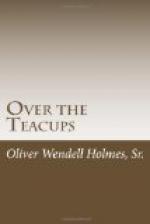“‘I tell you what it is,’ said Hiram, ’I’m a free and independent American citizen, and I an’t a-gon’ to hev no man tyrannize over me, if he doos call himself by one o’ them noblemen’s titles. Ef I can’t work jes’ as I choose, fur folks that wants me to work fur ’em and that I want to work fur, I might jes’ as well go to Sibery and done with it. My gran’f’ther fit in Bunker Hill battle. I guess if our folks in them days did n’t care no great abaout Lord Percy and Sir William Haowe, we an’t a-gon’ to be scart by Sir Michael Fagan and Sir Hans What ’s-his-name, nor no other fellahs that undertakes to be noblemen, and tells us common folks what we shall dew an’ what we sha’n’t. No, sir!’
“I took the opportunity to explain to Sir Michael and Sir Hans what it was our fathers fought for, and what is the meaning of liberty. If these noblemen did not like the country, they could go elsewhere. If they did n’t like the laws, they had the ballot-box, and could choose new legislators. But as long as the laws existed they must obey them. I could not admit that, because they called themselves by the titles the Old World nobility thought so much of, they had a right to interfere in the agreements I entered into with my neighbor. I told Sir Michael that if he would go home and help Lady Fagan to saw and split the wood for her fire, he would be better employed than in meddling with my domestic arrangements. I advised Sir Hans to ask Lady Schleimer for her bottle of spirits to use as an embrocation for his lame hip. And so my two visitors with the aristocratic titles staggered off, and left us plain, untitled citizens, Hiram and myself, to set our posts, and consider the question whether we lived in a free country or under the authority of a self-constituted order of quasi-nobility.”
It is a very curious fact that, with all our boasted “free and equal” superiority over the communities of the Old World, our people have the most enormous appetite for Old World titles of distinction. Sir Michael and Sir Hans belong to one of the most extended of the aristocratic orders. But we have also “Knights and Ladies of Honor,” and, what is still grander, “Royal Conclave of Knights and Ladies,” “Royal Arcanum,” and “Royal Society of Good Fellows,” “Supreme Council,” “Imperial Court,” “Grand Protector,” and “Grand Dictator,” and so on. Nothing less than “Grand” and “Supreme” is good enough for the dignitaries of our associations of citizens. Where does all this ambition for names without realities come from? Because a Knight of the Garter wears a golden star, why does the worthy cordwainer, who mends the shoes of his fellow-citizens, want to wear a tin star, and take a name that had a meaning as used by the representatives of ancient families, or the men who had made themselves illustrious by their achievements?




